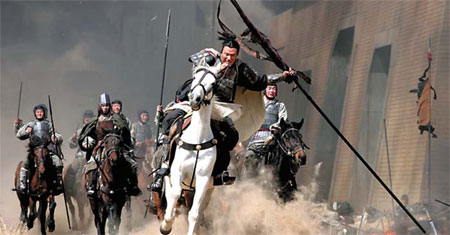 |
|
John Woo's War epic Red Cliff is lauded for its setting, visual effects, acting and narrative. [File photos] |
Director John Woo's Red Cliff grossed a record-breaking $103 million across Asia, and now the dynamo expects the film's sequel to hail a second round of box office bests.
While the first Red Cliff is about preparing for war, the second installment, which premiered in China on Wednesday, is about waging war. Throughout the film, third-century warlords and their strategists battle on land, at sea and among flames.
"I am very confident the second part will rake in more money than the first," 63-year-old Woo told a press conference in Beijing on Sunday.
His confidence derives from more than the fact the historical period in which the film is set is widely celebrated and has been featured in numerous books, comics and videogames. He is partly pegging his high hopes on the fact the first version won great acclaim since hitting theaters last July.
The buzz has extended beyond the box office to audiences, who have been delighted by the lightheartedness of the main characters' lines, especially those of heroic military masterminds Zhou Yu and Zhuge Liang.
Many loyal fans of Romance of the Three Kingdoms (Sanguo Yanyi), a beloved classic novel about the period Woo depicts, criticize him for "cartoonizing" their heroes. Others are glad to see a fresh interpretation of the storyline.
The sequel portrays the characters more as ordinary people than as heroes. Warlord Liu Bei becomes a confectioner. Noble militarist Zhuge Liang holds his trademark fan - even in winter - and forecasts the weather by observing his pet turtle's perspiration. And villain Cao Cao is a football fan who loses a critical battle over a cup of tea.
"China's costume epics over the past five years have been too heavy," Woo says. "I don't think history should be heavy. I want to make it more vivid."
"In my film, the historical characters are lively, just like you and me, so that young viewers can relate to them.
"I hope that after seeing my film, a young man may tell himself, OK, I can be Zhuge Liang one day."
Those who had trouble with Zhou and Zhuge - archenemies in the novel - getting along in the first film might freak when they become buddies in the sequel.
To Woo, the period and characters are just a canvas upon which he paints his own perception of Chinese heroes.
"I do not believe such a war in which the weak beat the strong would be possible if the two generals are not united," Woo says. "Moreover, the Chinese people's friendship and spirit of teamwork, instead of jealousy and hatred, is something I want to covey to global audiences."
Woo believes both Chinese and Western audiences will easily understand the film.
"For Chinese viewers, it is a familiar historical tale, the most famous ancient war story told in a new style," he says.
"For Western moviegoers, I will tell them it is not only a war epic featuring burning boats but also a story about love, morality and friendship, which I think are universal."
Woo doesn't care that some people call his work a Chinese Troy or 300. He is instead proud of directing a blockbuster lauded for its setting, visual effects, acting and narrative, and believes the film can compete with Hollywood productions.
"In addition to letting more people around the world know about Chinese history and culture, I also want to prove that today, in China, we are able to make a film as grand as Hollywood blockbusters."
(China Daily January 8, 2009)